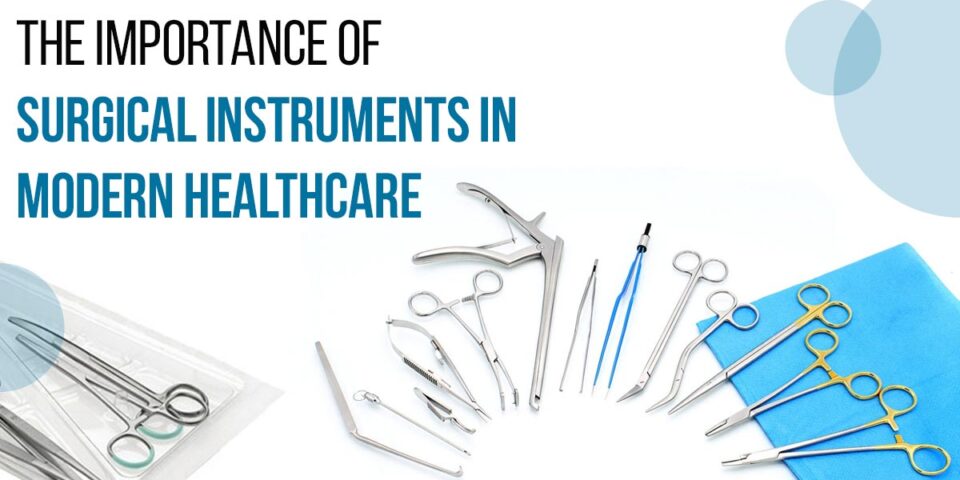The Importance of Surgical Instruments in Modern Healthcare
Surgical equipment are medical tools for surgery that plays a main role in prognosis, treatment, and patient care in today’s healthcare. From small equipment like to complex equipment and other surgical systems, these gadgets are important for proper functioning of all healthcare facilities and even small clinics. Surgical instruments are not just objects, they are an extension of a surgeon’s skills. This blog by R.L.Hansraj & Co delves into the significance of surgical instruments, their impact on healthcare results, and the advancements that continue to shape the future of medicine.
The Foundation of surgical instruments
Surgical instruments have changed during the past centuries. Early tools were made from stones or iron. As scientific expertise accelerated, so did the complexity and variety of surgical instruments. The creation of stainless steel within the 20th century revolutionized the sphere, making an allowance for the introduction of durable, sterilizable, and properly engineered devices. Today, surgical equipment is made from quality substances, designed to satisfy the stringent standards of modern medicine.
Types of General Surgical Instruments
General surgical tools may be broadly categorized into several types, each serving a specific purpose:
Cutting and Dissecting Instruments:
These contain scalpels, scissors and saws used for making incisions and cutting tissue and muscles. Scalpels are particularly important for their precision.
Grasping and Holding Instruments:
Forceps, clamps, and needle holders fall into this class. They help surgeons to keep tissues and objects securely during the treatment and procedures.
Retracting and Exposing Instruments:
These instruments are used to hold back tissues and organs, offering higher visibility and giving access to the surgical site.
Suturing and Stapling Instruments:
Needles, needle holders, and staplers are used to shut wounds and surgical incisions, making sure right recovery.
Suctioning and Aspirating Instruments:
Suction gadgets assist remove blood, fluids, and debris from the place of the surgery, keeping a clear subject for the doctors.
Diagnostic Instruments:
Instruments together with probes and endoscopes are used to take a look at internal structures and diagnose conditions.
Surgical Instruments in Patient Safety
Patient protection is paramount in healthcare, and surgical instruments are crucial in keeping high standards of care. Properly designed and maintained devices make sure that surgical procedures are accomplished with precision, minimizing the hazard of complications. For eg., the usage of sharp, properly maintained scalpels reduces tissue harm and promotes faster healing. At R.L.Hansraj & Co we have the best quality surgical instruments online to meet all the needs of health care professionals.
Sterilization of surgical devices is another important aspect. Infections will have severe consequences, and the ability to sterilize instruments successfully saves you from post operative infections. The introduction of disposable instruments for positive strategies has additionally contributed to improved patient protection with the aid of reducing the risk of cross contamination.
Advancements in Surgical Instruments
Technological improvements have substantially impacted the development of surgical contraptions, leading to advanced effects and performance. Some exquisite innovations consist of:
Advanced Imaging Integration:
Instruments included with superior imaging technologies, along with ultrasound and MRI, offer actual-time visualization, enhancing accuracy during surgical procedures.
Single-Use Instruments:
Designed for one-time use, those instruments eliminate the risk of contamination transmission and make sure that every procedure uses sterile tools.
The Impact on Patient Outcomes
The use of quality surgical equipment immediately correlates with better patient outcomes. Precision tools give you more accurate incisions, reducing tissue harm and aiding faster recovery. Minimally invasive tools result in staying in the hospital for a short period of time and faster recoveries, benefiting both patients and hospitals.
Additionally, the availability of specialized gadgets for particular procedures complements the doctor’s capacity to cope with complex medical situations efficiently. For instance, specialized instruments for orthopedic surgical procedures enable precise bone slicing and alignment, leading to better long term effects for patients with joint issues.
Training and Proficiency
The effectiveness of surgical devices additionally depends on the skill and ability of the medical professionals using them. Surgeons undergo vast schooling to grasp how to use these surgical instruments, making sure they could perform processes with the highest stage of competence. Continued training and hands-on practice are important to keep up with advancements in surgical technology and techniques.
General surgical instruments are essential in present-day healthcare, serving as the main part of successful surgical strategies. Their evolution, from basic instruments to state-of-the-art, high-tech gadgets, displays the advancements in medical technology and generation. The precision, protection, and performance provided using those instruments are critical for getting positive patient outcomes and advancing in the field of surgical treatment. As the era keeps adapting, the future holds extra potential for improvements so one can further improve the skills of surgical instruments, in the end getting good results for patients and healthcare systems globally.Shop with us for the best quality surgical equipment from our surgical shops in Chennai that promise durability, precision and exceptional performance in every use.

